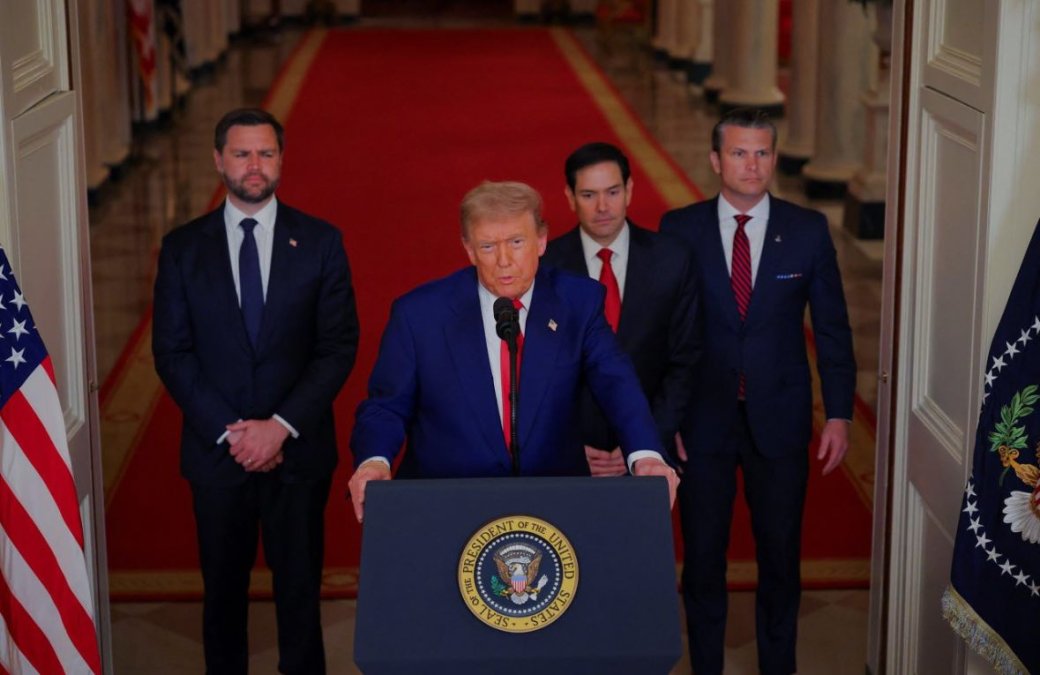From the Promise of Peace to the Brink of War: Trump’s Strategic Shift in the Middle East
From the Promise of Peace to the Brink of War: Trump’s Strategic Shift in the Middle East
Donald Trump, the president who returned to the White House in January this year with the slogan of establishing peace, has taken a significant step to directly involve the United States in the high-tension crisis between Iran and Israel. Since the start of his new presidency, instead of fulfilling the promise of peace in the Middle East, he has now taken on regional responsibility in an area on the brink of a broader war, a conflict in which the US is now considered an active player.
In a televised speech from inside the White House, just a little over two hours after news of the attack on three Iranian nuclear sites by American forces was spread on social media, the US President called this attack a remarkable achievement. He expressed hope that this action would pave the way for a more sustainable peace and prevent Iran from becoming a country with nuclear capabilities.
While Vice President J.D. Vance, Secretary of State Marco Rubio, and Secretary of Defense Pete Hegseth stood beside him, Trump warned Iran that if it continued its nuclear program, it would face much more severe and considerably easier attacks. Trump said that multiple targets still remained, and the United States would approach them with precision, speed, and skill.
Although the President took a firm stance, the continuation of US military operations on Iranian soil could create the worst possible scenario for the United States, the Middle East, and the entire world. UN Secretary-General António Guterres warned about the dangers of this decision, stating that the US action to escalate conflicts might plunge the region into a cycle of chaos, while the region is already in a very unstable state.
If Iran, as its leader Ayatollah Ali Khamenei warned, retaliates, the US might be forced to respond. When two weeks were reduced to two days, Trump adopted a harsher tone at the start of the week, saying that Iran must surrender unconditionally. This position put him in a situation where backing down was difficult, and Iran, with similar threats, left no room for retreat. This is how wars start, and then rapidly escalate beyond the will and imagination of the parties involved.
While Trump had given Iran a two-week deadline on Thursday, this period unexpectedly shortened to just two days. On Saturday night, the US President announced that he had ordered military operations. This raises the question of whether the two-week promise was merely a tactic to deceive Iran and create a sense of security over the weekend, or whether the diplomatic efforts led by Steve Witkoff, Trump’s special envoy for peace, had failed.
In the early hours following these attacks, limited information is available, but Trump, both in his speech and in social media posts, tried to present these attacks as a starting point for peace. However, this may be an overly optimistic view. Although Israel has made extensive efforts to reduce Iran’s military capabilities, Ayatollah Khamenei still holds leverage. Developments can quickly spiral out of control.
Attention is now focused on Iran’s potential reaction to the attack on three important sites, including the Fordow facility, which is a significant part of its nuclear program. Apparently, Trump hopes this military action will compel Iran to make more concessions at the negotiating table, but it is unlikely that a country that was unwilling to engage in dialogue even during Israeli attacks will now be inclined to compromise when faced with American bombs.
While Trump outwardly portrays this attack as an independent and successful event, if it yields no results, pressure for further actions will increase, or he will face a heavy political cost without any tangible military achievement. The president, who returned with the slogan of peace, is now in a critical position. Beyond the global security implications, this situation could also cause trouble for Trump in the domestic political arena.
The discussion about the possibility of war with Iran had previously faced sharp criticism not only from Democrats but also from members of the America First movement within Trump’s own camp. Trump’s unusual decision to deliver a national address alongside three of his most important advisors might be an attempt to convey unity within the Republican Party.
Particularly J.D. Vance, who advocates for a more cautious foreign policy for America, recently emphasized in social media posts that Trump remains committed to non-interventionist principles and that his supporters should consider this reality. If this attack is merely a limited and calculated action, Trump might be able to maintain cohesion among his supporters, but if it leads to a broader conflict, he may face serious opposition within his voter base.
The Saturday night operation was a bold move by a president who, during his first term, always prided himself on not dragging America into a new war and had repeatedly criticized previous presidents for involving the country in foreign conflicts during his recent election campaigns. Now Trump has taken his step, and from here on, the course of events is no longer entirely in his hands.

